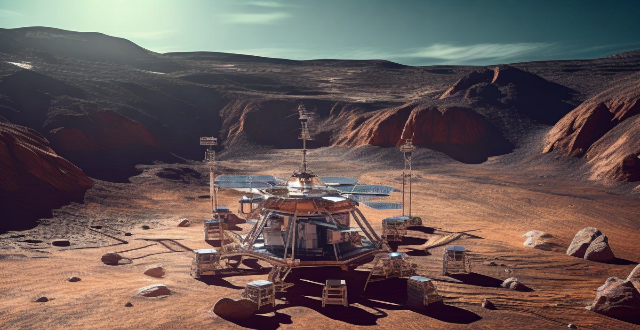The article discusses the pivotal role of Artificial Intelligence (AI) in revolutionizing various aspects of modern rocket technology. It explores how AI is transforming design and manufacturing processes, including computational fluid dynamics simulations, machine learning-driven material science, and automated manufacturing. The text also delves into AI's contributions to launch and orbital insertion, such as predictive maintenance, trajectory optimization, and real-time decision making. Furthermore, it highlights AI applications in on-orbit operations like autonomous navigation, swarm intelligence, and fault detection and recovery. The article concludes by discussing future implications of AI in deep space exploration, reusable rocketry, and collaborative robotics, emphasizing its potential to make space missions safer, more efficient, and cost-effective.

The Role of Artificial Intelligence in Modern Rocket Technology
Introduction
Artificial intelligence (AI) has become an integral part of modern rocket technology, revolutionizing the way we design, manufacture, launch, and operate rockets. In this article, we will explore the various ways AI is being used in the aerospace industry and its impact on the future of space exploration.
Design and Manufacturing
Computational Fluid Dynamics (CFD)
AI algorithms are used to simulate fluid dynamics and optimize rocket designs for maximum efficiency. This allows engineers to test different configurations and make informed decisions before building physical prototypes.
Machine Learning for Material Science
AI-driven material science helps identify new materials with improved properties, such as strength, weight, and thermal resistance. These advancements can lead to lighter, more durable rockets that are better suited for space missions.
Automated Manufacturing
AI-powered robotics and automation systems streamline the manufacturing process, reducing costs and increasing production rates. This enables faster turnaround times for rocket components and overall vehicle assembly.
Launch and Orbital Insertion
Predictive Maintenance
AI tools analyze data from sensors throughout the rocket's systems to predict potential failures or maintenance needs. This proactive approach ensures that issues are addressed before they become critical, increasing the likelihood of a successful launch.
Trajectory Optimization
AI algorithms calculate the most efficient path for a rocket to reach its target orbit, taking into account factors such as fuel consumption, gravity, and atmospheric conditions. This results in shorter travel times and reduced fuel usage.
Real-Time Decision Making
During launch, AI systems can quickly analyze data and make split-second decisions to correct course or adjust engine performance if necessary. This enhances safety and reliability during critical phases of flight.
On-Orbit Operations
Autonomous Navigation
AI-driven navigation systems enable rockets and their payloads to operate autonomously in space, without human intervention. This is particularly important for long-duration missions or when communication with Earth is limited.
Swarm Intelligence
Swarms of small satellites can use AI algorithms to coordinate their movements and activities, allowing them to work together more efficiently than individual units. This approach is useful for distributed sensing applications and can improve coverage over large areas.
Fault Detection and Recovery
AI systems monitor the health of on-orbit assets and can detect anomalies or faults that may require intervention. In some cases, AI can even initiate recovery procedures or rerouting commands to maintain mission objectives despite unexpected challenges.
Future Implications
As AI continues to advance, it will play an increasingly vital role in modern rocket technology:
- Deep Space Exploration: AI will be essential for managing complex interplanetary missions where real-time control from Earth is not feasible due to communication delays.
- Reusable Rocketry: AI will aid in developing reusable rockets by optimizing landing procedures and minimizing wear and tear on components.
- Collaborative Robotics: AI-powered robots could assist astronauts in constructing and maintaining space infrastructure, reducing the risk associated with extravehicular activities.
In conclusion, artificial intelligence is transforming every aspect of modern rocket technology, from design and manufacturing to launch operations and on-orbit management. Its integration promises safer, more efficient, and cost-effective space missions while opening doors to new possibilities in deep space exploration and beyond.